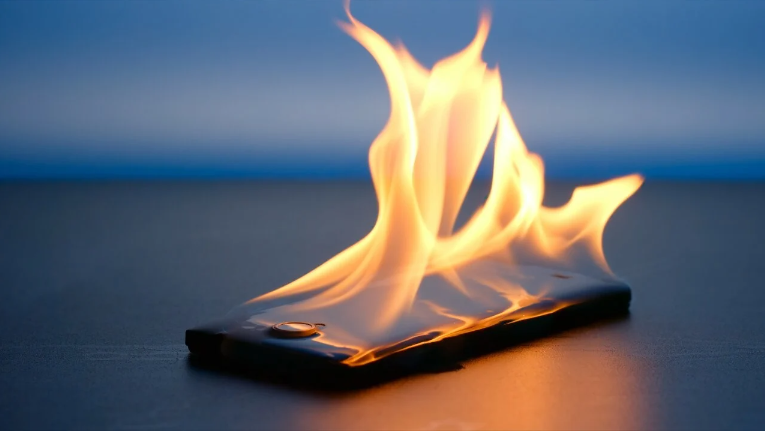
Sometimes smartphones explode. In January 2023, an iPhone 4 caught fire while charging overnight. A child in India was killed when a Redmi Note 5 Pro reportedly blew up in her face. In July, a man’s phone exploded on an Air India flight, causing an emergency landing.
The likelihood of your smartphone exploding is slim, but it happens, as demonstrated by Samsung’s Galaxy Note 7 fiasco a few years back. But why does it happen and what, if anything, can you do to avoid it?
Why Do Smartphones Explode?
There are many reasons a smartphone may catch fire or explode, and it almost always has to do with the device’s battery. Modern mobile devices are powered by lithium-ion batteries, which contain a careful balance of positive and negative electrodes to allow for recharging. When something goes wrong, the inner components of the battery can break down and create a volatile reaction that can lead to fires.
This can happen for multiple reasons, but the most common problem is excessive heat. If a charging battery or overworked processor becomes too hot too quickly, it can ruin the chemical makeup of the phone’s components. With batteries, a chain reaction called thermal runaway can cause the battery to generate even more heat and eventually catch fire or explode.
The reason for your phone overheating will vary. Physical damage—the kind sustained from a fall or excessive bending—can disrupt the inner workings of the battery. Leaving the phone out in the sun for too long, malware overworking the CPU, or a charging debacle can all cause short circuiting within the device.
Or it could be something outside your direct control. Batteries degrade over time, so if a device has been used for several years—like the iPhone 4 that caught fire—it’s possible for the internal components to fade, leading to swelling and overheating. As was the case with the Galaxy Note 7, an issue with the phone’s production may be to blame, which you can’t really account for.
How to Save Your Phone Battery
Want your phone to last longer? You can’t prevent every issue, but there are several dos and don’ts that may help you maintain the health of your device and avoid a fire:
1. Get a Phone Case
Not every phone is going to go up in flames after a fall, but one way to protect your device’s innards is to cover it with a phone case—preferably one with a lip around the edge of the phone. These cases aren’t as expensive as they once were, and even the cheapest offer more protection than nothing. At this point, there’s no excuse to go without one.
2. Avoid Extreme Temperatures
You probably know that heat is your phone’s worst enemy, but what about cold? Your phone’s battery is optimized to work within a certain temperature range—between 32-95 degrees Fahrenheit. Regularly exposing the battery to harsh conditions will cause internal components to expand and contract, resulting in long-term damage to the parts within.
This means you should avoid leaving your device in direct sunlight or on top of a hot radiator for long periods of time, especially when charging. You should also avoid freezing cold temperatures whenever possible. So don’t place your phone inside the freezer, if you still believe in that myth, or leave it in your car when it drops below freezing.
3. Don’t Cover Your Phone While It’s Charging
Your best option is to place your phone on a flat, hard surface—like a table or desk—when it’s time to charge the device. Snuggling up to it at night runs the risk of you rolling on top of it, wrapping it in blankets, or covering it with a pillow. To be safe, keep the device free from plush surfaces, papers, or general clutter.
4. Use the Right Charger
Your device needs optimal voltage and current to charge properly, so we recommend sticking with the charger that came in the box or grabbing one directly from the phone’s manufacturer. That means if you have a Samsung phone, buy a cable from Samsung; if you have an iPhone, get a charger from the Apple Store.
You also shouldn’t mix and match cables and power bricks because different units have different wattage levels. It may be tempting to save some money and get a cheap charger off Amazon or use whatever you have around the house, but this is a good way to ruin your battery.
5. Look Out for Malware
If you become infected with malware, the nefarious program may hog your phone’s resources for tasks like crypto mining, which can overheat the battery and potentially damage the phone. Does your phone run slower than it probably should? Get hot for no good reason? Hit you with nonstop pop-ups? You could be infected with malware.
Thanks to the closed-off nature of Apple’s App Store, the iPhone tends to be less susceptible to malware. The same can’t be said about the Google Play Store, but many popular antivirus companies offer antivirus apps for Android as part of multi-device subscriptions.
Don’t Worry, Your Phone Is Unlikely to Explode
In spite of all these warnings—and how common they might appear on the news—exploding phones are still extremely rare. When the Galaxy Note 7 was recalled by Samsung in 2016, only about 100 of the 2.5 million units shipped were reported to have exploded. That’s still scarier than zero, but if you’re concerned about ruining your phone, there are more common issues to worry about.
We hope these tips have been helpful in your business. Please let us know if you have any questions about your IT environment or how to secure it from outside cyber threats. We are here for you! Contact us at (732) 780-8615 or email at [email protected].
Jason Cohen, “Why Phones Explode, and How to Prevent It From Happening to You”, pcmag.com, Sep 29, 2023
